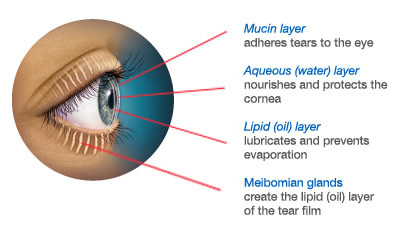Meibomian Gland Disorder
What is it?
Meibomian glands are oil glands located in our upper and lower lids. These glands produce and secrete a complex oil that mixes with the watery part of our tears to prevent tear evaporation between blinks. Sometimes these glands get stopped up leaving the oil trapped in the gland and not mixing with the other components of the tears. This leads to tears evaporating too quickly which causes dryness. Symptoms of dry eye include sandy, gritty feeling eyes, burning, and intermittently blurred vision.

The mainstay treatment for meibomian gland dysfunction (MGD) is warm compresses. Heat turns the stagnant oils from a thick gel phase to more of a liquid phase. It also dilates the ducts that transport the oil. These two functions lead to more efficient gland function and a more stable tear film. A warm shower or washcloth are novel approaches of this technique, however, for better results more contact time and physical pressure are better. The “rice baggy” technique is a favorite among dry eye sufferers. This is done by filling a cloth bag or sock with uncooked, dry rice or beans. Next, tie a knot in the open end. Place this in the microwave for approximately 90 seconds until hot (be careful not to overheat and burn your skin). Rest this heating pad over your closed eyes for at least 5 minutes. Do this once daily for one week, then 2-3 times per week to maintain healthy glands. Many people find that the “rice baggy” works better than a warm washcloth because it distributes the weight evenly over the lids and it retains the heat for many minutes.
Another treatment for MGD is by taking a natural anti-inflammatory medication by mouth. These are the Omega-3 Fatty Acid supplements (fish oil). These supplements have been linked to a myriad of health benefits including lowering cholesterol, heart disease risk and autoimmune disease. We recommend 2,000mg of fish oil by mouth with breakfast. It has been shown that eating a diet rich in cold water fish such as cod, salmon, tuna, etc. may be the best way to get these nutrients. Patients taking anticoagulants such as Aspirin, Plavix or Coumadin should discuss this with their eye doctor before starting a Fish Oil regimen. Additional blood testing may be required to determine if it is safe.
For more advanced conditions prescription eyedrops &/or oral medicines may be required.


